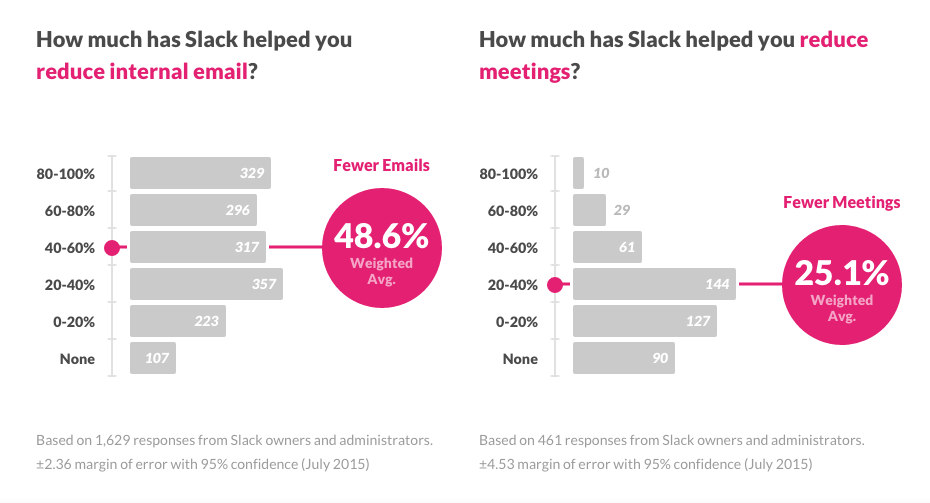For generations, employees have endured a peculiar workplace tradition. They spend hours a day deleting, filing, forwarding and searching a form of communication called email. Endless chains are created as people seek to solve problems, get answers, showcase accomplishments, demonstrate progress and keep everyone in the loop.
Now Slack is poised to kill these age-old traditions once and for all.
Which begs the question:
Are meetings next?
Consider what happens when you type “meetings are” into Google:

Clearly, there are a lot of people who feel that fewer meetings would make work lives simpler, more pleasant and more productive. It makes sense, then, that Slack would emerge as a champion of challenge to the antiquated routine of daily and weekly status meetings. While most media attention has gone to Slack as “email killer,” another piece of news has flown under the radar:
In July 2015, Slack’s CEO announced that the company had cancelled every recurring meeting until team leaders had a chance to figure out which ones it really needed.
Could this be a sign of what’s to come? Will Slack’s app advocates begin to adopt similar approaches? If so, how? And what will the work world look like if we continue to remove emails from inboxes and meetings from calendars?
Challenging the Institution of Email
Slack is currently in a unique position to help usher in a new era of workplace culture. While tools like Atlassian’s HipChat have influenced some shifts in the ways teams communicate, none have won over the hearts and souls of entire organizations as quickly or steadily as Slack. Some 15,000 users ballooned to more than two million in a little over two years. NASA, The New York Times and SalesForce all rely heavily on it.
Consider what Slack has already famously done to email. Companies using the app currently report reductions in email as high as 75%. A deeply ingrained habit decades in the making is eradicated from entire teams within a matter of weeks.

When you look at it this way, it’s easy to see why millions of people are embracing Slack’s searchable archive as a viable alternative to email—and somewhat surprising it hasn’t happened on such a wide scale until now.
The Persistence of Unproductive Meetings
While email may have finally met its match, it appears that mindless meetings—the ones dictated more by routine than need—are still endured. Reductions in meetings as a result of Slack are occurring at roughly half the rate of email.

The problem with this approach is that it’s impossible to create a meeting environment where attendees feel invested. Countless surveys and studies have demonstrated how little people absorb during status meetings, opting instead to discretely work on other tasks or even fall asleep. And then there’s Parkinson’s law of triviality, which essentially states that people in groups will turn to trivial topics because no one wants to admit they don’t understand why they’re in the room.
The greatest irony of all? Many people wait for meeting summary emails to extract the information they actually need.
Here’s what Slack founder Stewart Butterfield had to say about this process in a recent interview with Inc.:
“Respecting people’s time is important. Everyone should try to make the lives of everyone else who works here a little bit simpler. So if you’re going to call a meeting, you’re responsible for it, and you have to be clear what you want out of it.”
The Search for a Meeting Antidote
As Slack itself experiments with eliminating meetings, will its influence cause a ripple effect? Could Slack be, as Inc.’s Jeff Bercovici called it, the “antidote to the dysfunction of an office culture in which meetings are a necessary evil?”
The answer to this question likely lies in Slack’s new app directory and development framework. If live chat channels alone aren’t enough to eradicate extraneous meetings, perhaps more streamlined integrations with other specialized apps will be.
For example, online standups can be used to make projects and progress visible so teams can address challenges as they arise. This integration alone can significantly cut down on the need for meetings—and make the ones that remain really matter. Quantity goes down, quality goes up and discussions become laser-focused and results-oriented.
We’re excited to be a part of Slack’s new app directory and the possibilities that are being opened up as the platform expands and more developer tools become available.
Could a future free from both email excess and mindless meetings be on the horizon? We sure hope so.
